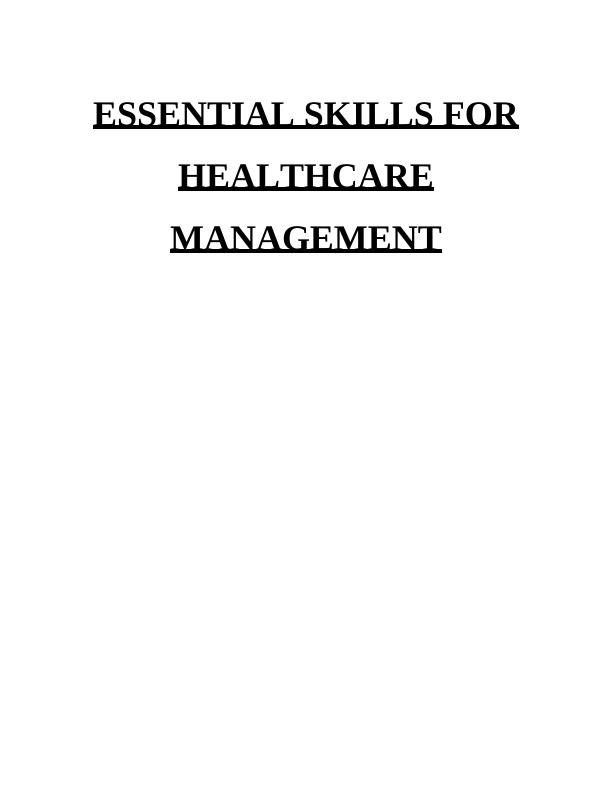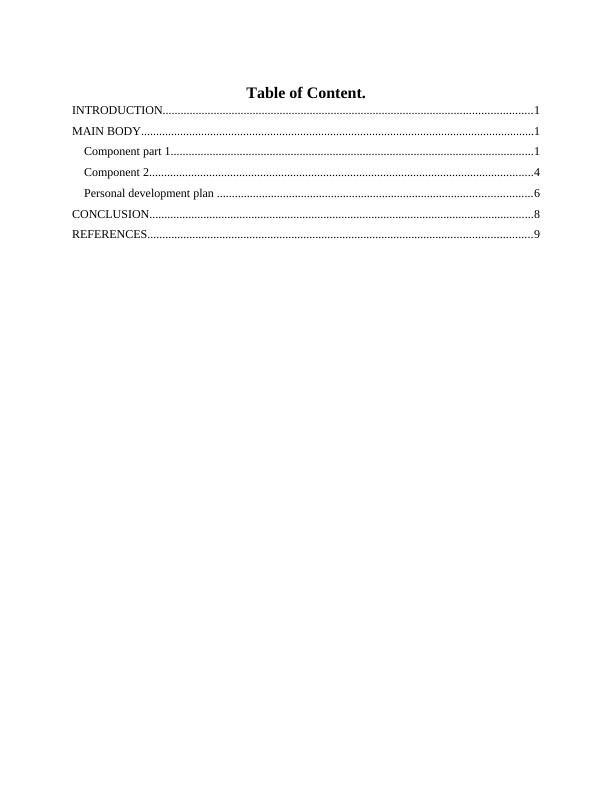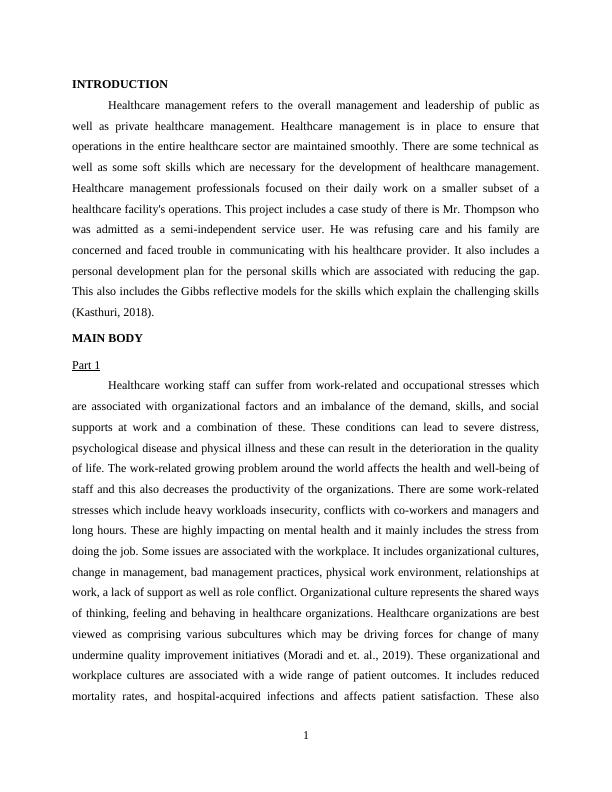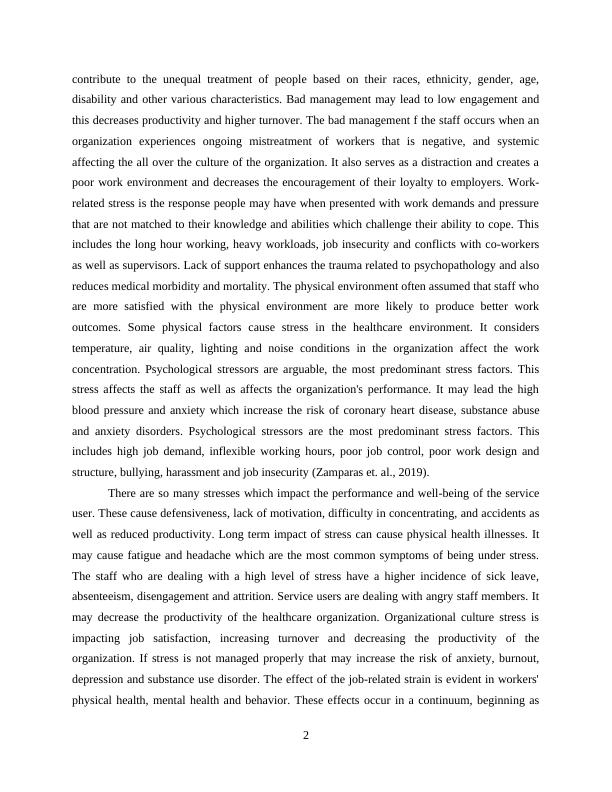Essential Skills for Healthcare Management - Importance of Soft Skills and Stress Management
Added on 2023-06-08
11 Pages3880 Words484 Views
ESSENTIAL SKILLS FOR
HEALTHCARE
MANAGEMENT
HEALTHCARE
MANAGEMENT

Table of Content.
INTRODUCTION...........................................................................................................................1
MAIN BODY...................................................................................................................................1
Component part 1.........................................................................................................................1
Component 2................................................................................................................................4
Personal development plan .........................................................................................................6
CONCLUSION................................................................................................................................8
REFERENCES................................................................................................................................9
INTRODUCTION...........................................................................................................................1
MAIN BODY...................................................................................................................................1
Component part 1.........................................................................................................................1
Component 2................................................................................................................................4
Personal development plan .........................................................................................................6
CONCLUSION................................................................................................................................8
REFERENCES................................................................................................................................9

INTRODUCTION
Healthcare management refers to the overall management and leadership of public as
well as private healthcare management. Healthcare management is in place to ensure that
operations in the entire healthcare sector are maintained smoothly. There are some technical as
well as some soft skills which are necessary for the development of healthcare management.
Healthcare management professionals focused on their daily work on a smaller subset of a
healthcare facility's operations. This project includes a case study of there is Mr. Thompson who
was admitted as a semi-independent service user. He was refusing care and his family are
concerned and faced trouble in communicating with his healthcare provider. It also includes a
personal development plan for the personal skills which are associated with reducing the gap.
This also includes the Gibbs reflective models for the skills which explain the challenging skills
(Kasthuri, 2018).
MAIN BODY
Part 1
Healthcare working staff can suffer from work-related and occupational stresses which
are associated with organizational factors and an imbalance of the demand, skills, and social
supports at work and a combination of these. These conditions can lead to severe distress,
psychological disease and physical illness and these can result in the deterioration in the quality
of life. The work-related growing problem around the world affects the health and well-being of
staff and this also decreases the productivity of the organizations. There are some work-related
stresses which include heavy workloads insecurity, conflicts with co-workers and managers and
long hours. These are highly impacting on mental health and it mainly includes the stress from
doing the job. Some issues are associated with the workplace. It includes organizational cultures,
change in management, bad management practices, physical work environment, relationships at
work, a lack of support as well as role conflict. Organizational culture represents the shared ways
of thinking, feeling and behaving in healthcare organizations. Healthcare organizations are best
viewed as comprising various subcultures which may be driving forces for change of many
undermine quality improvement initiatives (Moradi and et. al., 2019). These organizational and
workplace cultures are associated with a wide range of patient outcomes. It includes reduced
mortality rates, and hospital-acquired infections and affects patient satisfaction. These also
1
Healthcare management refers to the overall management and leadership of public as
well as private healthcare management. Healthcare management is in place to ensure that
operations in the entire healthcare sector are maintained smoothly. There are some technical as
well as some soft skills which are necessary for the development of healthcare management.
Healthcare management professionals focused on their daily work on a smaller subset of a
healthcare facility's operations. This project includes a case study of there is Mr. Thompson who
was admitted as a semi-independent service user. He was refusing care and his family are
concerned and faced trouble in communicating with his healthcare provider. It also includes a
personal development plan for the personal skills which are associated with reducing the gap.
This also includes the Gibbs reflective models for the skills which explain the challenging skills
(Kasthuri, 2018).
MAIN BODY
Part 1
Healthcare working staff can suffer from work-related and occupational stresses which
are associated with organizational factors and an imbalance of the demand, skills, and social
supports at work and a combination of these. These conditions can lead to severe distress,
psychological disease and physical illness and these can result in the deterioration in the quality
of life. The work-related growing problem around the world affects the health and well-being of
staff and this also decreases the productivity of the organizations. There are some work-related
stresses which include heavy workloads insecurity, conflicts with co-workers and managers and
long hours. These are highly impacting on mental health and it mainly includes the stress from
doing the job. Some issues are associated with the workplace. It includes organizational cultures,
change in management, bad management practices, physical work environment, relationships at
work, a lack of support as well as role conflict. Organizational culture represents the shared ways
of thinking, feeling and behaving in healthcare organizations. Healthcare organizations are best
viewed as comprising various subcultures which may be driving forces for change of many
undermine quality improvement initiatives (Moradi and et. al., 2019). These organizational and
workplace cultures are associated with a wide range of patient outcomes. It includes reduced
mortality rates, and hospital-acquired infections and affects patient satisfaction. These also
1

contribute to the unequal treatment of people based on their races, ethnicity, gender, age,
disability and other various characteristics. Bad management may lead to low engagement and
this decreases productivity and higher turnover. The bad management f the staff occurs when an
organization experiences ongoing mistreatment of workers that is negative, and systemic
affecting the all over the culture of the organization. It also serves as a distraction and creates a
poor work environment and decreases the encouragement of their loyalty to employers. Work-
related stress is the response people may have when presented with work demands and pressure
that are not matched to their knowledge and abilities which challenge their ability to cope. This
includes the long hour working, heavy workloads, job insecurity and conflicts with co-workers
as well as supervisors. Lack of support enhances the trauma related to psychopathology and also
reduces medical morbidity and mortality. The physical environment often assumed that staff who
are more satisfied with the physical environment are more likely to produce better work
outcomes. Some physical factors cause stress in the healthcare environment. It considers
temperature, air quality, lighting and noise conditions in the organization affect the work
concentration. Psychological stressors are arguable, the most predominant stress factors. This
stress affects the staff as well as affects the organization's performance. It may lead the high
blood pressure and anxiety which increase the risk of coronary heart disease, substance abuse
and anxiety disorders. Psychological stressors are the most predominant stress factors. This
includes high job demand, inflexible working hours, poor job control, poor work design and
structure, bullying, harassment and job insecurity (Zamparas et. al., 2019).
There are so many stresses which impact the performance and well-being of the service
user. These cause defensiveness, lack of motivation, difficulty in concentrating, and accidents as
well as reduced productivity. Long term impact of stress can cause physical health illnesses. It
may cause fatigue and headache which are the most common symptoms of being under stress.
The staff who are dealing with a high level of stress have a higher incidence of sick leave,
absenteeism, disengagement and attrition. Service users are dealing with angry staff members. It
may decrease the productivity of the healthcare organization. Organizational culture stress is
impacting job satisfaction, increasing turnover and decreasing the productivity of the
organization. If stress is not managed properly that may increase the risk of anxiety, burnout,
depression and substance use disorder. The effect of the job-related strain is evident in workers'
physical health, mental health and behavior. These effects occur in a continuum, beginning as
2
disability and other various characteristics. Bad management may lead to low engagement and
this decreases productivity and higher turnover. The bad management f the staff occurs when an
organization experiences ongoing mistreatment of workers that is negative, and systemic
affecting the all over the culture of the organization. It also serves as a distraction and creates a
poor work environment and decreases the encouragement of their loyalty to employers. Work-
related stress is the response people may have when presented with work demands and pressure
that are not matched to their knowledge and abilities which challenge their ability to cope. This
includes the long hour working, heavy workloads, job insecurity and conflicts with co-workers
as well as supervisors. Lack of support enhances the trauma related to psychopathology and also
reduces medical morbidity and mortality. The physical environment often assumed that staff who
are more satisfied with the physical environment are more likely to produce better work
outcomes. Some physical factors cause stress in the healthcare environment. It considers
temperature, air quality, lighting and noise conditions in the organization affect the work
concentration. Psychological stressors are arguable, the most predominant stress factors. This
stress affects the staff as well as affects the organization's performance. It may lead the high
blood pressure and anxiety which increase the risk of coronary heart disease, substance abuse
and anxiety disorders. Psychological stressors are the most predominant stress factors. This
includes high job demand, inflexible working hours, poor job control, poor work design and
structure, bullying, harassment and job insecurity (Zamparas et. al., 2019).
There are so many stresses which impact the performance and well-being of the service
user. These cause defensiveness, lack of motivation, difficulty in concentrating, and accidents as
well as reduced productivity. Long term impact of stress can cause physical health illnesses. It
may cause fatigue and headache which are the most common symptoms of being under stress.
The staff who are dealing with a high level of stress have a higher incidence of sick leave,
absenteeism, disengagement and attrition. Service users are dealing with angry staff members. It
may decrease the productivity of the healthcare organization. Organizational culture stress is
impacting job satisfaction, increasing turnover and decreasing the productivity of the
organization. If stress is not managed properly that may increase the risk of anxiety, burnout,
depression and substance use disorder. The effect of the job-related strain is evident in workers'
physical health, mental health and behavior. These effects occur in a continuum, beginning as
2

End of preview
Want to access all the pages? Upload your documents or become a member.
Related Documents
Essential Skills for Health and Care Management A1lg...
|6
|2024
|344
Psychology of Healthcare Management: Causes, Impact, and Importance of Managing Stress in the Workplacelg...
|12
|5129
|137
Nursing Leadership Report 2022lg...
|11
|2805
|20
Health and Social Care Management Answer 2022lg...
|10
|1837
|16
Developing Operational Management Skills for Healthcare Practice Managing the team at Beverley Care Homelg...
|20
|6718
|238
Stress Management at Workplacelg...
|7
|1740
|48
